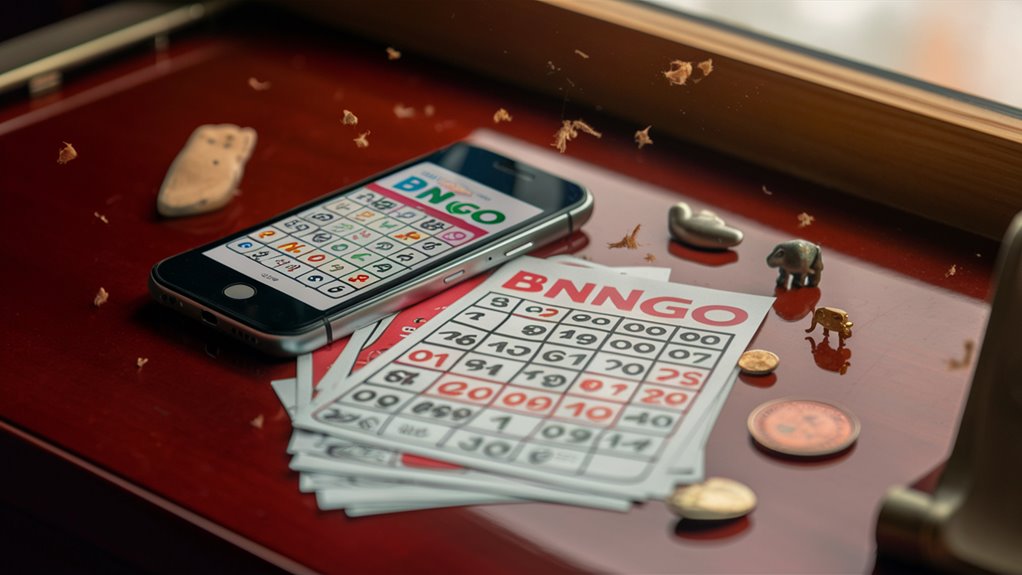Ever wondered how online casinos make sure everything stays fair and square? It's actually pretty fascinating stuff. Think about it – when you're playing your favorite slot game or joining a poker table online, you want to know nobody's stacking the deck in their favor, right?
Well, that's where fairness algorithms come into play. They're like the digital referees working behind the scenes, making sure every card dealt and every slot spin is completely random. You know how in real casinos you can see the dealer shuffle cards or watch the roulette wheel spin? These algorithms do basically the same thing, just in the virtual world.
Let's break it down in simple terms. These systems use some pretty clever math and coding to generate truly random results, just like shuffling a physical deck of cards. The cool part is that they're constantly running checks to make sure everything stays on the up and up. It's kind of like having a super-detailed security camera watching every single move, but instead of catching shoplifters, it's catching any attempts to cheat the system.
But here's the thing – most players don't really know about these digital guardians keeping their games fair. It's a bit like the safety features in your car; you might not think about them much, but they're always there protecting you. These algorithms are constantly working to make sure that when you win, it's because lady luck smiled on you, not because someone tipped the scales.
So next time you're trying your luck online, remember there's some seriously smart technology making sure everyone gets a fair shot at winning. Pretty neat, isn't it?
What Are Fairness Algorithms

Let's break down what fairness algorithms are in online gambling – they're pretty fascinating when you think about it. You know how we all wonder if online casino games are actually random? Well, that's exactly where these clever mathematical formulas come in.
Think of fairness algorithms as the digital equivalent of shuffling cards or spinning a roulette wheel. They're basically sophisticated computer programs that generate random outcomes for every game you play online.
Just like you'd trust a dealer in a real casino, these algorithms make sure nobody can predict or manipulate the results.
The really cool part is how they work behind the scenes. They use something called cryptographic techniques, which might sound complicated, but it's similar to having a super-secure digital lock on your game results.
Ever wondered how online slots determine if you've won? The algorithm takes various factors into account and spits out a result that's just as random as pulling that lever in Vegas.
But here's what makes modern online gambling even better: you can actually check if the games are fair. It's called a "provably fair" system, and it's pretty neat.
Before you place a bet, you get a special code, kind of like a digital receipt. After the game, you can use this code to verify that everything was on the up-and-up. It's like having a referee watching every game you play.
Most online casinos use tried-and-tested algorithms based on mathematical principles with fancy names like Mersenne Twister or SHA-256. But don't get hung up on the technical stuff – what matters is that these systems ensure you're getting the same fair shot at winning as you'd in any brick-and-mortar casino.
Types of Random Number Generators
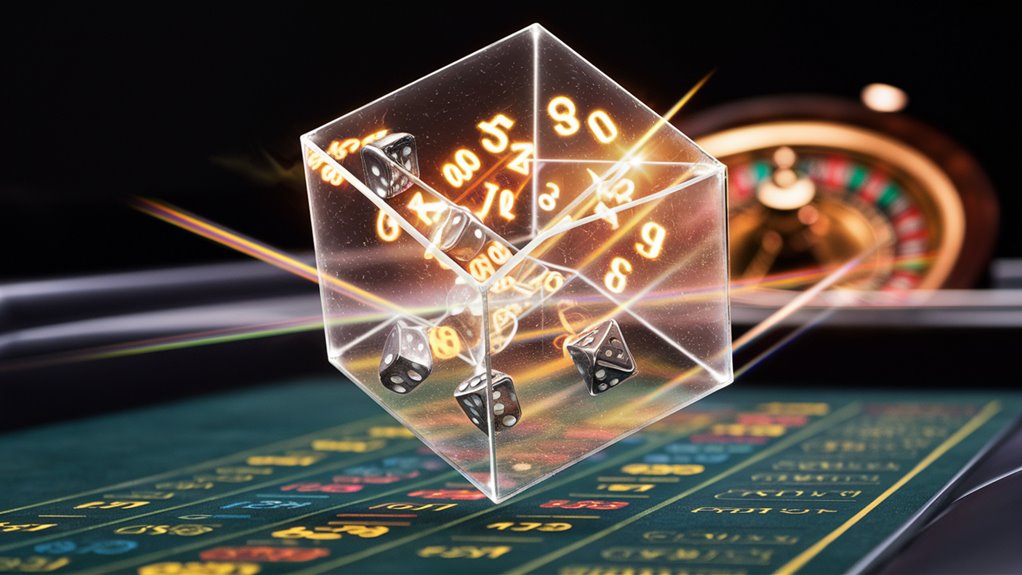
Let's break down the fascinating world of random number generators, those clever systems that power our favorite online casino games. You know how sometimes you wonder if those digital dice rolls are really random?
Well, there are actually two main types that make it all happen.
First up, we've got True Random Number Generators, or TRNGs for short. Think of these as nature's randomness captured in digital form.
They work by measuring things we can't predict, like the static noise in the atmosphere or even tiny changes in temperature. It's pretty mind-blowing stuff, really.
You'll mostly find these in super-secure setups and some high-end online casinos where they need that extra layer of unpredictability.
But here's what you're more likely to run into: Pseudo-Random Number Generators (PRNGs). These are like mathematical magicians that use complex formulas to create numbers that look random to us.
Picture it like shuffling a deck of cards using the same pattern every time, but the pattern is so complicated that you'd never spot it. While they're not technically "true random," they work perfectly fine for casino games when set up correctly.
So how can you tell if a PRNG is any good? Well, it's kind of like a really long playlist – you don't want the same songs repeating too soon.
Quality PRNGs take a long time before their number patterns repeat, spread their numbers evenly, and pass strict statistical tests. The best online casinos use extra-secure versions that get regularly checked by independent labs.
And if you're curious about a casino's credentials, look for their RNG certificates – reputable places love showing these off and keep their systems updated to stay fair and square.
Provably Fair Gaming Technology

Let's break down how provably fair gaming technology is changing online casinos in ways you mightn't expect.
You know how people often worry about whether online games are truly random? Well, that's where three clever innovations come into play: blockchain verification, cryptographic hashing, and public seed generation.
Think of it like this – when you sit down to play at a provably fair casino, you get your own special code (we call it a client seed) before the game starts. Meanwhile, the casino creates its own code too, but here's the interesting part: they encrypt it and share it with you right away.
Once your game wraps up, you can actually check both these codes to make sure everything was on the level.
The really cool thing about using blockchain is that it's like having an permanent digital record book. Every single game result gets stored there forever, and no one, not even the casino, can go back and fiddle with the numbers.
It's kind of like writing in permanent marker – once it's there, it's there for good.
Now, about that cryptographic hashing process – it's pretty clever. Imagine trying to change just one tiny detail in the server seed. The whole system would immediately notice because the hash value would be completely different.
Most provably fair casinos give you simple tools to check the math behind each game yourself. You don't have to trust what someone else tells you anymore – you can actually see for yourself that everything's legitimate, right down to the last detail of every bet you make.
What makes this whole system so revolutionary is that players don't need to rely on outside auditors anymore. You've got all the tools right at your fingertips to verify every single game. Pretty neat, right?
Cryptographic Hash Functions Explained

Let's break down how cryptographic hash functions make online gaming fair and transparent. You know how fingerprints are unique to each person?
Well, hash functions work in a similar way – they create unique digital fingerprints for any piece of information you feed into them.
When you're playing at an online casino that uses provably fair systems, these functions do something pretty clever. They take whatever input data is involved in your game and transform it into a fixed string of characters.
The cool thing is, once this transformation happens, there's no way to work backward and figure out the original input. It's like a one-way street in the digital world.
Here's what makes these hash functions really special for fair gaming. First off, they're super consistent – if you put in the same information twice, you'll get the same result every time. Sort of like how 2 + 2 always equals 4.
Second, they're practically impossible to trick. You can't find two different pieces of information that create the same hash output, which means casinos can't tamper with the results.
The whole process is actually quite straightforward. Before your game starts, the casino creates a hash of the outcome and shows it to you. Think of it as a sealed envelope containing the result.
After the game ends, they reveal the original information, and you can verify everything yourself. Just run that information through the same hash function, and if it matches what they showed you at the start, you know everything was on the level.
Popular functions like SHA-256 and MD5 keep this whole system running smoothly and securely.
Player Verification Methods
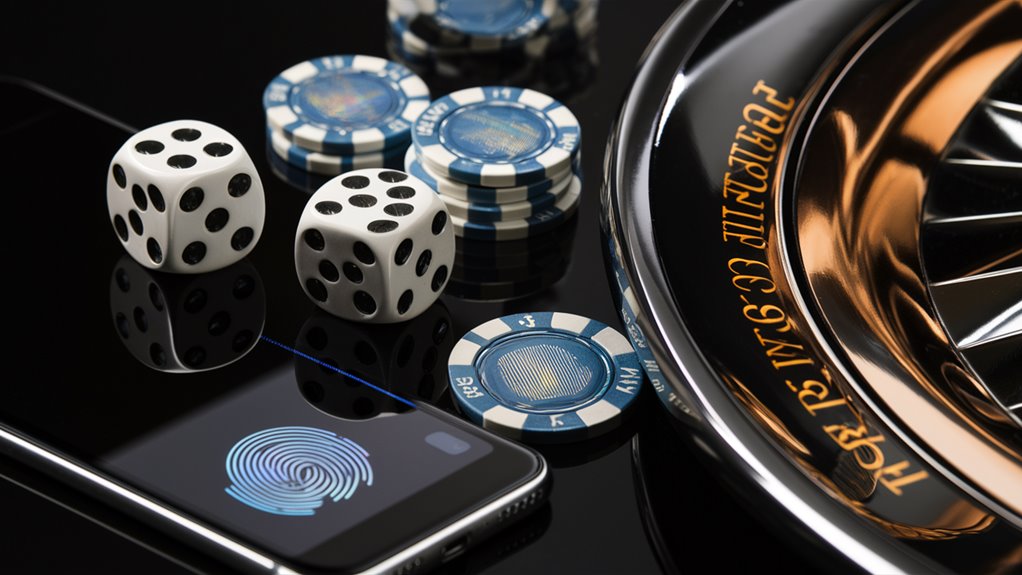
Let's talk about how online casinos make sure you're really you – it's actually pretty interesting stuff.
When you first sign up, you'll need to share a few important documents, kind of like when you're opening a bank account. Think government ID, a recent utility bill, and maybe even a quick selfie with your ID in hand.
You know how banks have that whole "Know Your Customer" thing? Online casinos do too.
They'll run your documents through some smart verification systems, and real people will take a look as well. It's like having a security guard check your ID at a fancy club, but way more thorough.
Now, about money matters. Before you can start moving funds around, the casino needs to know those payment methods actually belong to you.
So if you're using a credit card or bank account, get ready to show some statements. And don't be surprised when they ask you to punch in a special code sent to your phone – it's just an extra safety net to keep your money secure.
Here's something cool: the casino's system is pretty smart about spotting unusual patterns.
Playing from your laptop at home one day and suddenly logging in from a different country the next? They'll probably ask you to verify it's really you.
Think of it as your personal security team working behind the scenes to keep everything safe and fair.
Bottom line? These checks might seem like a bit of a hassle, but they're actually protecting both you and the casino.
Plus, they help keep everything above board with gambling laws. It's kind of like having a really thorough bouncer who's actually looking out for your best interests!
Regulatory Standards and Compliance
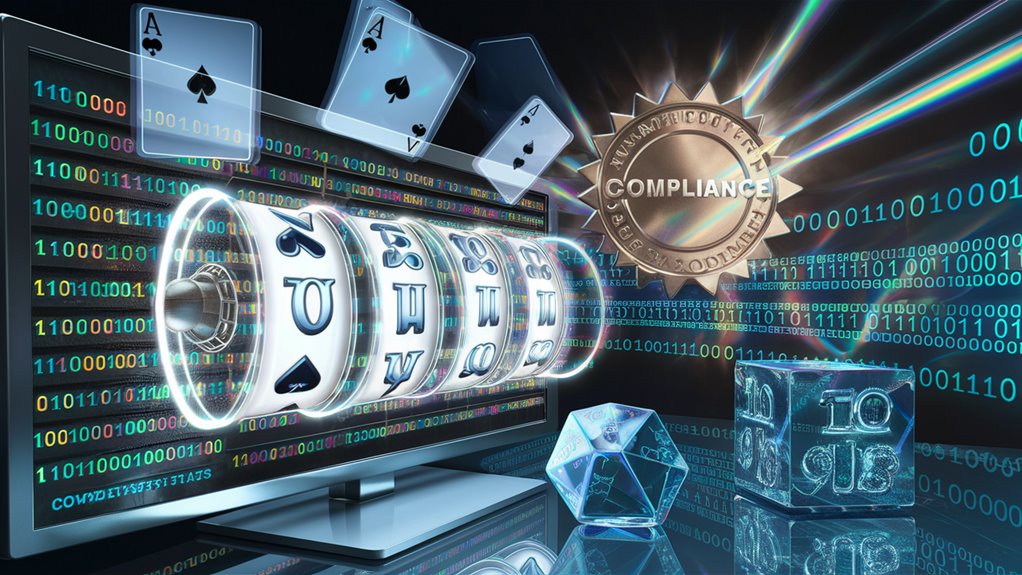
Let's break down the complex world of regulatory standards in online gambling. You know how every business has rules to follow? Well, online casinos have some of the strictest ones out there.
They need to jump through quite a few hoops to stay compliant with various governing bodies, like the Malta Gaming Authority and UK Gambling Commission.
Think of these regulations as a safety net for players like you and me. Every time you click that spin button or deal a virtual hand, there's a whole system of checks and balances working behind the scenes.
The casino needs to prove their games are fair, their random number generators actually work randomly, and they're keeping your data safe and sound.
Getting compliant isn't a one-and-done deal either. It's more like maintaining a car – you need regular check-ups and updates to keep everything running smoothly.
Casinos have to bring in independent testing companies (eCOGRA is a big one) to verify their systems regularly. They check everything from payout percentages to encryption methods, making sure the casino plays by the rules.
Want to know if your favorite online casino is legit? Look for their certificates and testing badges, usually displayed at the bottom of their website.
It's like a seal of approval that shows they're meeting international standards. And since technology and regulations keep evolving, good casinos are always updating their systems to stay ahead of the curve.
Testing and Certification Process
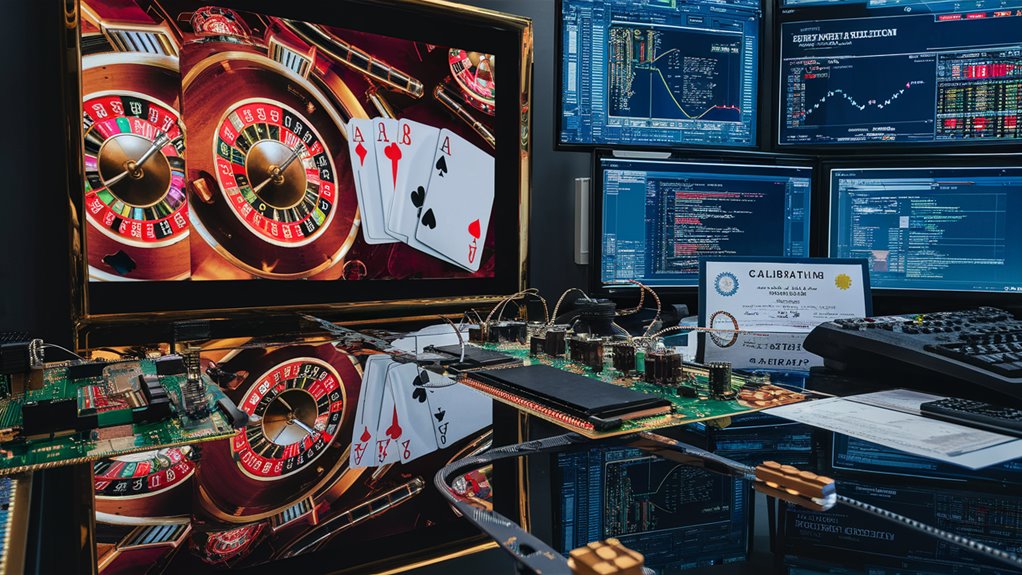
Let's break down how casino testing and certification really works. You know how we always hear about fair gaming and random outcomes? Well, there's actually quite a bit happening behind the scenes to make sure everything's legit.
Before a casino can open its virtual doors, it needs to go through some serious testing. Think of it like a really thorough health inspection, but for gambling. Testing labs like eCOGRA and GLI dig deep into every aspect of the operation.
They'll run thousands of game rounds to check if everything's working as it should, kind of like stress-testing a new car before it hits the road.
The whole process is pretty fascinating. These testing experts spend weeks looking through computer code, running complex calculations, and basically trying their best to break the system.
They're checking for any sneaky ways someone might try to cheat, making sure those jackpot odds are exactly what the casino claims they are. It's a bit like having a super-detailed security check at an airport, where nothing gets past unnoticed.
Want to know if a casino has passed all these tests? Just scroll to the bottom of their website. That's where you'll usually find their certificates, complete with unique numbers you can verify yourself.
But here's the thing: passing once isn't enough. Casinos need to keep proving they're playing by the rules through regular checkups, usually every few months or once a year.
If they slip up, those certificates can be taken away faster than you can say "jackpot," and their gambling licenses could be at risk too.
Future of Casino Gaming Security

Let's talk about what's coming up in casino security – it's pretty exciting stuff! You know how technology keeps changing at lightning speed? Well, the same goes for keeping casinos safe and fair.
Think of it like having a super-smart bodyguard that never sleeps.
Blockchain technology is changing the game completely. Picture having a digital ledger that records every single bet and win, kind of like having thousands of witnesses watching each transaction.
And here's where it gets really interesting – AI systems are becoming like casino detectives, spotting suspicious betting patterns before they become problems.
The way you'll log into your casino account is getting a major upgrade too. Remember how we used to just type in passwords?
Soon you'll be using your face or fingerprint to access your account, just like unlocking your smartphone. Pretty cool, right? And the systems protecting you're getting smarter by the day, learning from new tricks that cheaters try to pull off.
What's really fascinating is how automated everything's becoming. Smart contracts will handle payouts automatically, kind of like having a robot dealer who can't make mistakes.
And get this – the random number generators are going quantum. That's basically like having the laws of physics themselves pick your card numbers. No more wondering if the games are truly random!
The best part? All these security measures will work together seamlessly across different devices. So whether you're playing on your phone, tablet, or computer, you'll have the same rock-solid protection.
It's like having a personal security bubble that follows you around in the digital casino world.
Common Questions
Can Players Manipulate Fairness Algorithms to Increase Their Winning Odds?
Let's talk about fairness algorithms in gaming – you might be wondering if there's a way to beat the system. Well, the short answer is no, but it's actually pretty fascinating why that's the case.
Think of these algorithms like a super-secure vault with multiple locks. You can't just pick one lock and get in. Modern casinos use incredibly sophisticated systems that combine advanced cryptography (fancy math, basically) with truly random number generation. It's kind of like trying to predict where lightning will strike next – technically possible but practically impossible.
Every single move you make gets checked and double-checked by multiple security layers. The moment something looks fishy, the system flags it. You know how your bank catches weird purchases on your credit card? Casino security systems are like that, but way more intense.
Some players think they've found patterns or ways to predict outcomes, but here's the thing – these systems are specifically designed to prevent that. They're constantly evolving, getting smarter, and adapting to new tampering attempts. It's a bit like trying to outsmart a chess grandmaster who already knows your next 20 moves.
How Often Do Online Casinos Update Their Random Number Generation Systems?
Let's talk about how online casinos keep their random number generators fresh and secure. You might be wondering how often these systems get updated, and the answer is pretty interesting. Most casinos run their updates on a monthly or quarterly schedule, though some take an even more proactive approach with weekly maintenance.
Think of it like your smartphone's security updates. Just as you get those regular patches to keep your device safe, online casinos need to ensure their RNG systems stay secure and reliable. Some casinos stick to a regular schedule, while others jump into action whenever there's a significant security improvement or algorithm enhancement available.
The frequency really depends on the casino's specific needs and their security protocols. While monthly updates are common, you'll find that major security threats or technological breakthroughs can trigger immediate system updates, regardless of the regular schedule. It's similar to how a bank might update its security systems, where routine maintenance is important, but urgent fixes can't wait for the next scheduled update.
What Happens to Fairness Algorithms During Internet Connection Interruptions?
Let's break down what really happens to fairness algorithms during those annoying internet hiccups. You know how frustrating it can be when your connection drops in the middle of something important, right? Well, here's the good news: those fairness algorithms are pretty resilient.
Think of these algorithms like a patient record-keeper who doesn't miss a beat. When your internet connection decides to take an unexpected break, the server-side systems keep humming along, carefully tracking and storing every single outcome. It's kind of like having a backup dancer who keeps the show going even if the spotlight temporarily goes out.
The best part? You don't need to worry about losing your progress or getting unfair results. The system is designed to maintain complete fairness, whether you're connected or not. Once your internet springs back to life, everything syncs up smoothly, and it's business as usual. Your game outcomes stay perfectly intact, just as if the disconnection never happened.
Do Mobile Casino Apps Use Different Fairness Algorithms Than Desktop Versions?
Let's get straight to the heart of mobile casino gaming and fairness. You know how some people worry that playing on their phone might give them worse odds than sitting at their computer? Well, I've got good news for you.
Whether you're tapping away on your smartphone or clicking your mouse on a desktop, you're actually connecting to the exact same gaming systems. Think of it like checking your bank account – whether you use the mobile app or the website, you're accessing the same account with the same balance.
The random number generators (RNG) that determine your gaming outcomes live on secure servers, not on your device. It's kind of like watching Netflix – the content is identical whether you're streaming on your phone or your laptop. Your device is just a window to access the casino's main system.
Can Quantum Computing Break Current Casino Fairness Algorithm Systems?
You know, it's fascinating to think about how quantum computing might shake up the casino industry. The short answer is yes, quantum computers could potentially crack current random number generators that casinos use, but here's the thing – the gambling industry isn't sitting around waiting for that to happen. They're pretty smart about staying ahead of the curve.
Think of it like this: while traditional casino systems are like having a really solid lock on your front door, quantum computing is like giving potential hackers a super-powered lockpick. But casino tech developers aren't just crossing their fingers and hoping for the best. They're already working on the equivalent of quantum-proof locks, developing new algorithms that can stand up to even the most powerful quantum computers.
Let's break it down a bit. Current RNG systems are pretty robust for today's technology, but quantum computing operates on a whole different level. It's like comparing a bicycle to a rocket ship in terms of processing power. That said, casinos have a huge incentive to keep their games fair and secure, which is why they're investing heavily in quantum-resistant security measures.
The bottom line? While quantum computing poses some interesting challenges for casino security, the industry is adapting fast. Players can rest easy knowing that by the time quantum computers become a real threat, casinos will likely have already upgraded their systems to handle these new challenges.








